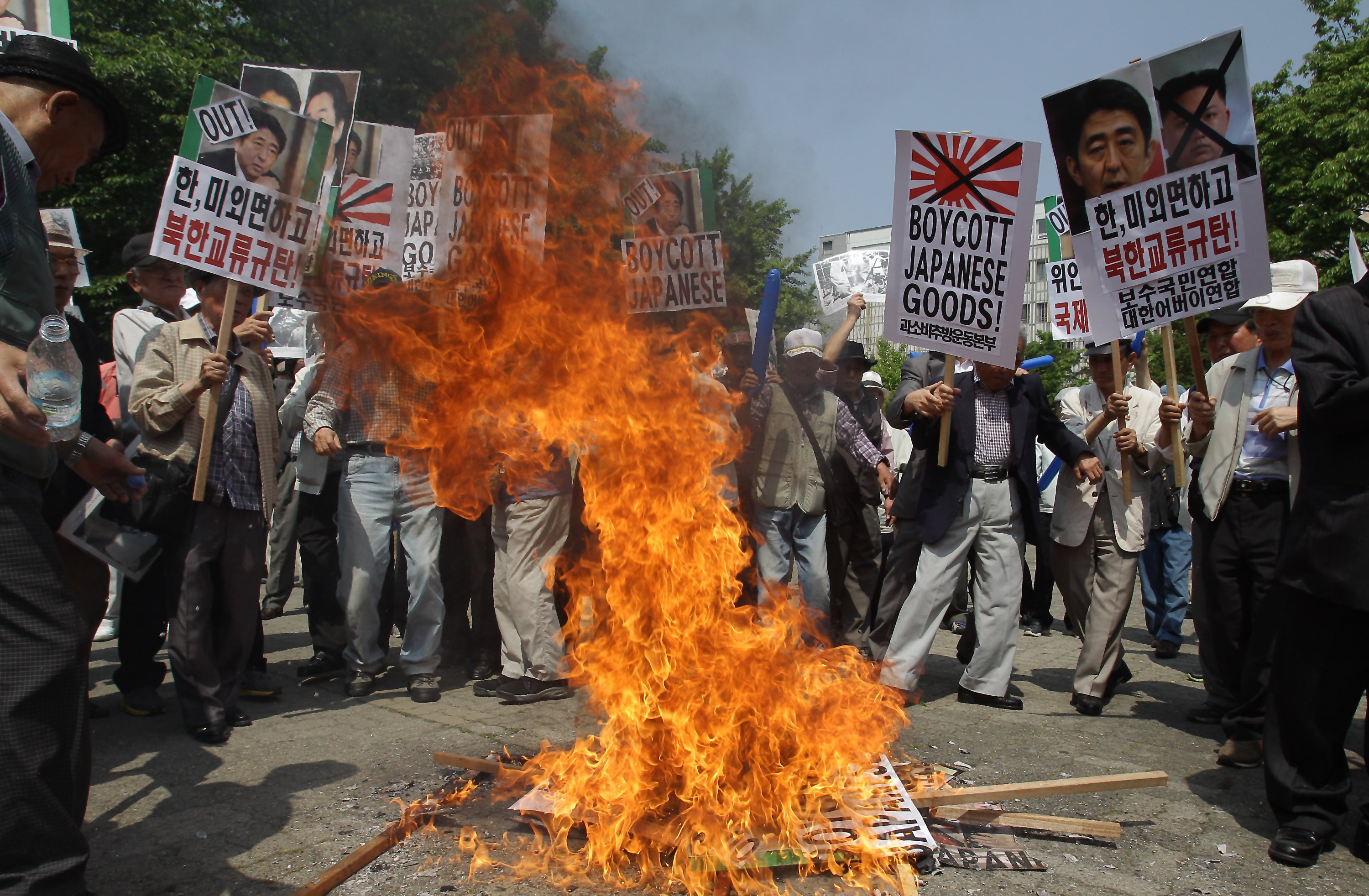South Korea announced Thursday it will not renew its bilateral military information-sharing pact with Japan, known as the General Security of Military Information Agreement, or GSOMIA. Amid ongoing South Korea-Japan trade disputes and North Korea’s latest wave of short-range missile tests, this decision heightens regional tensions, undermining not only South Korea’s national security interests but also America’s and Japan’s.
South Korea and Japan signed the GSOMIA in November 2016 to provide both countries with a direct line of communication for the exchange of classified military information regarding both North Korea’s ballistic missile launches and conventional military operations. South Korea’s satellite intelligence, after all, is limited to domains south of the military demarcation line. By contrast, Japan’s Self-Defense Forces have several intelligence satellites monitoring North Korean activity north of the military demarcation line. The GSOMIA thus fills intelligence gaps that both countries have.
The GSOMIA builds upon a December 2014 trilateral information-sharing agreement among South Korea, Japan and the U.S. aimed at enhancing the transparency of intelligence regarding North Korean nuclear and ballistic missile threats. Yet this agreement was limited only to information sharing with regard to North Korean nuclear weapons and missiles while ignoring intelligence on conventional military threats. Additionally, the agreement stipulated that South Korea and Japan could only exchange intelligence by using the U.S. as an intermediary.
Both Washington and Seoul have repeatedly hailed the GSOMIA’s importance. As recently as this month, U.S. Defense Secretary Mark Esper and South Korea President Moon Jae-in not only reaffirmed the GSOMIA’s value, but stressed the need to resolve any concerns about it amicably.
Intelligence sharing, said Esper, “is key to us in our common defense against North Korea.” Despite this, Moon’s deputy national security adviser, Kim Hyun-chong, insisted Seoul’s termination of GSOMIA was a legitimate “product of extensive deliberations and taken in accordance with national interest.”
RELATED

Recent North Korean actions illustrate the imperative of allied cooperation. On Aug. 23, shortly after Seoul’s GSOMIA announcement, North Korea fired two short-range missiles off its east coast. In the last month alone, North Korea conducted five separate tests of short-range missiles that are capable of striking both Seoul and Tokyo. Japan’s new 2019 defense whitepaper assessed that North Korea has already achieved the miniaturization of nuclear weapons and warheads for ballistic missiles. This is the first time Japan or any other government has reached such a conclusion.
By failing to renew the GSOMIA, South Korea undercuts its own national security, playing directly into the hands of North Korea and its Chinese and Russian allies. Moreover, Seoul’s move weakens U.S.-South Korea relations and undermines the deterrence posture of the United States and its regional partners against Pyongyang.
Seoul’s decision also exacerbates prospects for upcoming burden-sharing talks between Washington and Seoul. In February, the two sides wrapped up months of negotiations that saw Seoul settle on agreeing to increase its contribution by 8.2 percent more than the previous level. With another annual review coming up, there is concern U.S. demands for greater South Korean financial contributions could widen fissures in the alliance.
Additionally, following the GSOMIA decision, any opponents of the U.S.-South Korea alliance may use Seoul’s latest decision as a rationale to question why the U.S. should continue supporting South Korea when it appears to care so little about its own national security.
Eliminating the GSOMIA in turn provides Pyongyang with an indirect concession, as it not only undermines South Korea-Japan security cooperation, but also weakens the U.S. and its allies’ extended deterrence posture against North Korea. Moreover, the Moon administration’s inclination to provide direct concessions through economic incentives — namely reopening Kaesong Industrial Complex and the Kumgang Mountain resort — further compounds the GSOMIA decision’s damaging impact.
Seoul’s GSOMIA decision likely stems not from strategic considerations, but from an ongoing trade dispute that reflects decades of animosity between South Korea and Japan. Specifically, the heart of the dispute falls back on Seoul’s grievances against Japan’s historic role as its former colonizer. After weeks of retaliatory trade measures against one another, President Moon seemed to hint at a potential reconciliation during his speech on Liberation Day on Aug. 15. Moon extended an olive branch to Japan when he stressed Seoul will “gladly join hands” with Tokyo through dialogue. Yet, his administration choose to act otherwise.
U.S. Secretary of State Mike Pompeo voiced Washington’s “strong concern and disappointment” regarding the GSOMIA decision. A State Department spokesman added: “This decision would have a negative effect on U.S. security interests and those of our allies.” South Korean Foreign Minister Kang Kyung-wha has sought to deflect criticism by arguing that the decision “is a separate issue from the South Korea-U.S. alliance, and the alliance will incessantly strengthen cooperation.”
To mitigate the negative effects of Seoul’s actions, the U.S. must work to bring its two feuding allies together. Last week, Stephen Biegun, Washington’s special representative for North Korea, visited Seoul after completing a trip to Tokyo. While Biegun’s primary focus was on preparing for working-level talks with North Korea, the Moon administration’s sudden decision, which can arguably be described as national security malpractice, forced him to address this issue.
Resolving the historical and sociopolitical disputes will take time. However, Seoul’s erratic and arguably irrational decision should be a wake-up call for Washington to help its two allies resolve this persistent conflict. Without bold leadership from Washington, Seoul and Tokyo, this situation will only get worse in a manner that favors North Korean interests.
David Maxwell, a 30-year veteran of the U.S. Army and a retired Special Forces colonel, is a senior fellow at the Foundation for Defense of Democracies, where Mathew Ha is a research associate. Both contribute to FDD’s Center on Military and Political Power.








